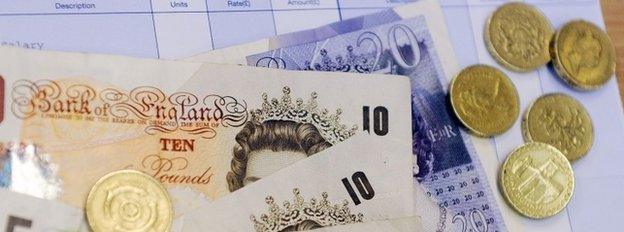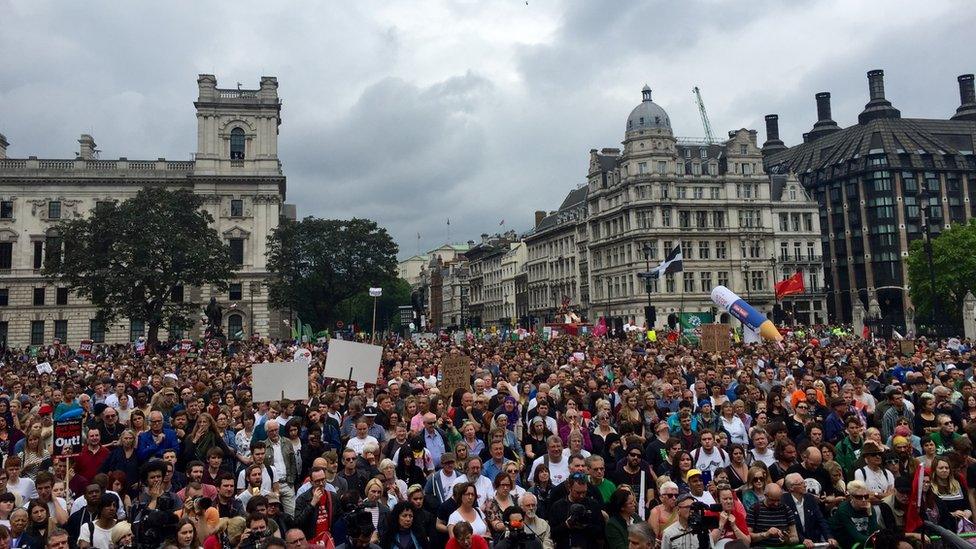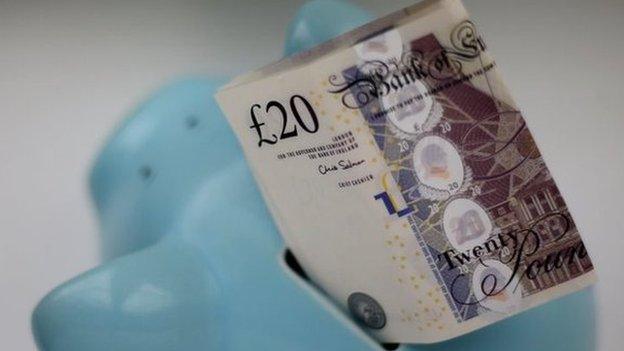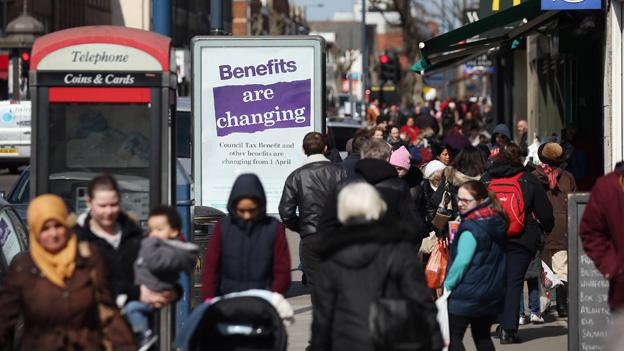David Cameron speech: I'll end welfare merry-go-round
- Published
David Cameron says he wants to deal with the "causes of problems like poverty, not the symptoms"
David Cameron has promised an end to what he called the "ridiculous merry-go-round" of taxing low earners then handing them money back in benefits.
The prime minister said it was wrong to treat "the symptoms of the social and economic problems we face" while "ignoring the causes" of low pay.
He argued the UK should be a "lower tax, lower welfare society".
It comes amid a debate over plans for £12bn in welfare cuts, the details of which have not been revealed.
The government says the welfare bill has to take its fair share of cuts as part of its plan to balance the books and eliminate the £90bn deficit by 2017-8.
With ministers having pledged to protect pensioner benefits and child benefit, BBC assistant political editor Norman Smith said Mr Cameron's speech was a "pretty clear steer" that much of the £12bn would come from tax credits and housing benefit.
Follow reaction to the speech and all the day's developments on Politics Live
Ahead of next month's Budget, in which Chancellor George Osborne is expected to give more details of which entitlements will be cut, Labour has warned of a likely cut to the £29bn annual tax credit bill.
'Lifetime on benefits'
According to the Treasury, about 4.5 million families received child and working tax credits in 2013-4, nearly 70% of which were in some form of employment.
Norman Smith says David Cameron will give a "pretty clear steer" that he is looking to curb tax credits
In a speech in Runcorn, Mr Cameron said he wanted to move from a "low wage, high tax, high welfare society to a high wage, low tax, low welfare" one.
He condemned what he called "a tolerance of government failure" in social policy, citing "sink schools that have failed one generation after another".
Almost all of the 117,000 "troubled families" identified for intervention had been "turned around" in terms of school attendance or getting a job, he said.

By Nick Robinson, the BBC's political editor
"You identify a million people who you'd like to take £1,000 away from and I'll do it."
That's what a former Tory benefits axeman in the 1990's used to tell fellow MPs who urged him to find an easy £1bn cut from the nation's welfare bills.
So, "all" that his successor, Iain Duncan Smith, and the Chancellor, George Osborne, have to do now is identify 12 million people they'd like to take £1,000 away from.
The two men met with the prime minister last Thursday to find agreement on how to find the £12bn they've promised to cut from the nation's benefit bill in the next two years. It is not clear that they have yet found it.

Mr Cameron said he would "always make sure that work pays", while striving to reducing the tax burden on the low-paid, ensure the minimum wage reflects improvements in the economy and guarantee young people have the skills to compete in the workplace.
"When it comes to extending opportunity - there is a right track and a wrong track," he said.
"The right track is to recognise the causes of stalled social mobility and a lack of economic opportunity. Family breakdown. Debt. Addiction. Poor schools. Lack of skills. Unemployment. People capable of work, written off to a lifetime on benefits.
"Recognise those causes, and the solutions follow. Strong families that give children the best start in life. A great education system that helps everyone get on. A welfare system that encourages work - well paid work."
'Right track'
He added: "The wrong track though, is to ignore the causes, and simply treat the symptoms of the social and economic problems we face.
"Take for example the complacency in how we approach the crucial issue of low pay. There is what I would call a merry-go-round.
"People working on the minimum wage having that money taxed by the government and then the government giving them that money back - and more - in welfare.
"Again, it's dealing with the symptoms of the problem - topping up low pay rather than extending the drivers of opportunity - helping to create well paid jobs in the first place."

The welfare budget in brief

In 2015-6, spending on benefits, pensions and tax credits is expected to total £220bn
State pensions and age-related benefits, such as winter fuel allowance and free TV licences, will account for £95bn
Child tax credits and working tax credits - £30bn
Housing benefit - £26bn
Disability and incapacity benefits - £37bn
Child benefit - £12bn
Pension credit - £6bn
Jobseekers Allowance and income support - £5bn
Source: Institute for Fiscal Studies

Harriet Harman, the acting leader of the Labour Party, said reducing tax credits would be "absolutely the wrong thing to do".
She said: "This is going to hit hard at families where they're going out to work but they're low paid so they need tax credits to top up their income." People on tax credits are not "abusers of the welfare system" she added.
The TUC said the government had "smashed the myth" that it was on the side of working people, warning cuts to tax credits would leave many families "on the poverty line".
But speaking in the House of Commons, Work and Pensions Secretary Iain Duncan Smith accused the last Labour government of using tax credits to "try and buy votes", saying spending had jumped markedly in the run-up to the 2005 and 2010 general elections.
Pressed by Labour MPs to categorically rule out cuts to disability benefits, Mr Duncan Smith said claimants with disabilities should not be "fearful" of the government's plans as "the most vulnerable" would be protected.
"We have to review welfare policy but we want to do it in a way that changes lives," he said, adding that "we debated the overall figure of £12bn and they (Labour) lost the election".
- Published22 June 2015
- Published20 June 2015

- Published11 June 2015

- Published30 April 2015
